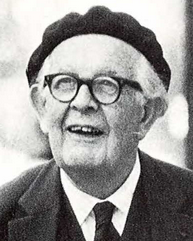
Back Jean Piaget Afrikaans جان بياجيه Arabic جان بياجيه ARZ Jean Piaget AST Jan Piaje Azerbaijani ژان پیاژه AZB Жан Піяжэ Byelorussian Жан Пиаже Bulgarian जीन पियाजे Bihari জঁ পিয়াজে Bengali/Bangla
Jean Piaget | |
|---|---|
 Piaget at the University of Michigan, c. 1968 | |
| Born | Jean William Fritz Piaget 9 August 1896 Neuchâtel, Switzerland |
| Died | 16 September 1980 (aged 84) Geneva, Switzerland |
| Alma mater | University of Neuchâtel University of Zürich |
| Known for | Constructivism, Genevan School, genetic epistemology, theory of cognitive development, object permanence, egocentrism |
| Scientific career | |
| Fields | Developmental psychology, epistemology |
Jean William Fritz Piaget (UK: /piˈæʒeɪ/,[1][2] US: /ˌpiːəˈʒeɪ, pjɑːˈʒeɪ/;[3][4][5] French: [ʒɑ̃ pjaʒɛ]; 9 August 1896 – 16 September 1980) was a Swiss psychologist known for his work on child development. Piaget's theory of cognitive development and epistemological view are together called genetic epistemology.[6]
Piaget placed great importance on the education of children. As the Director of the International Bureau of Education, he declared in 1934 that "only education is capable of saving our societies from possible collapse, whether violent, or gradual".[7] His theory of child development has been studied in pre-service education programs. Nowadays, educators and theorists working in the area of early childhood education persist in incorporating constructivist-based strategies.
Piaget created the International Center for Genetic Epistemology in Geneva in 1955 while on the faculty of the University of Geneva, and directed the center until his death in 1980.[8] The number of collaborations that its founding made possible, and their impact, ultimately led to the Center being referred to in the scholarly literature as "Piaget's factory".[9]
According to Ernst von Glasersfeld, Piaget was "the great pioneer of the constructivist theory of knowing".[10] His ideas were widely popularized in the 1960s.[11] This then led to the emergence of the study of development as a major sub-discipline in psychology.[12] By the end of the 20th century, he was second only to B. F. Skinner as the most-cited psychologist.[13]
- ^ Jones, Daniel (2011). Roach, Peter; Setter, Jane; Esling, John (eds.). Cambridge English Pronouncing Dictionary (18th ed.). Cambridge University Press. ISBN 978-0-521-15255-6.
- ^ "Piaget, Jean". Lexico UK English Dictionary. Oxford University Press. Archived from the original on 7 May 2021.
- ^ "Piaget". The American Heritage Dictionary of the English Language (5th ed.). HarperCollins. Retrieved 10 August 2019.
- ^ "Piaget". Collins English Dictionary. HarperCollins. Retrieved 10 August 2019.
- ^ "Piaget". Merriam-Webster.com Dictionary. Merriam-Webster. Retrieved 10 August 2019.
- ^ Jean Piaget's Theory and Stages of Cognitive Development, by Saul McLeod, Simply Psychology, updated 2018
- ^ Munari, Alberto (1994). "Jean Piaget" (PDF). Prospects: The Quarterly Review of Comparative Education. XXIV (1/2): 311–327. doi:10.1007/bf02199023. S2CID 144657103. Archived (PDF) from the original on 31 October 2008.
- ^ "About Piaget". Jean Piaget Society. Archived from the original on 24 August 2019. Retrieved 17 October 2016.
- ^ Burman, J. T. (2012). "Jean Piaget: Images of a life and his factory". History of Psychology. 15 (3): 283–288. doi:10.1037/a0025930. ISSN 1093-4510. PMID 23397918.
- ^ von Glasersfeld, E. (1990). "An exposition of constructivism: Why some like it radical". Journal for Research in Mathematics Education: Monograph. 4: 19–29 & 195–210 [22]. doi:10.2307/749910. ISSN 0883-9530. JSTOR 749910. (p. 22).
- ^ Hsueh, Y (2009). "Piaget in the United States, 1925–1971. In U. Müller, J. I. M. Carpendale & L. Smith (Eds.), The Cambridge Companion to Piaget (pp. 344–370). Cambridge, UK: Cambridge University Press. Müller, U., Burman, J. T., & Hutchinson, S. (2013). The developmental psychology of Jean Piaget: A quinquagenary retrospective". Journal of Applied Developmental Psychology. 34 (1): 52–55. doi:10.1016/j.appdev.2012.10.001.
- ^ Pickren, W. E. (2012). Joseph McVicker Hunt: Golden age psychologist. In W. E. Pickren, D. A. Dewsbury, & M. Wertheimer (Eds.), Portraits of Pioneers in Developmental Psychology (pp. 185–203). New York: Psychology Press/Taylor & Francis.
- ^ Haggbloom, Steven J.; Warnick, Renee; Warnick, Jason E.; Jones, Vinessa K.; Yarbrough, Gary L.; Russell, Tenea M.; Borecky, Chris M.; McGahhey, Reagan; Powell, John L. III; Beavers, Jamie; Monte, Emmanuelle (2002). "The 100 most eminent psychologists of the 20th century" (PDF). Review of General Psychology. 6 (2): 139–152. doi:10.1037/1089-2680.6.2.139. S2CID 145668721. Archived (PDF) from the original on 25 December 2014.